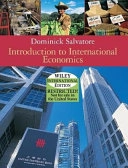How the world economy really works. From restrictions on the flow of international trade, to the globalization of capital markets, to the frequent financial and economic crises in emerging markets--the international economic problems facing the world today seem more challenging and complex than ever before. With Dominick Salvatore's straightforward, brief, real-world introduction to international economics, you can learn the essential principles you need to understand how the world economy works. A wealth of cases makes the material relevant. The text features 81 cases from economics and business (three to six per chapter). These real-world case studies are generally short and to the point, and illustrate the most important topics presented in the chapter. Chapters that deal with the same basic concept use a consistent example. The same graphical and numerical model is used in Chapters 2 through 6 (the chapters that deal with trade theory and policy) eliminating the need to start with a new example each time. Examples that use actual numbers and graphs are presented on scales. This makes the various concepts and theories presented more concrete, accessible, pertinent, and the graphs easier to read and understand. Helpful learning tools reinforce key concepts. Each chapter includes a wealth of learning tools, such as Learning Objectives, Key Terms, Concept Checks, Summaries, Review Questions and Problems, and Internet links. Web resources keep you up to date. The Companion Website (www.wiley.com/college/salvatore) for this text presents additional examples, cases, and theoretical points and questions, as well as problems that can be answered or solved using the Internet. The website is continuously updated to reflect important new developments in the international economy as they unfold.
Åtkomstkoder och digitalt tilläggsmaterial garanteras inte med begagnade böcker





















